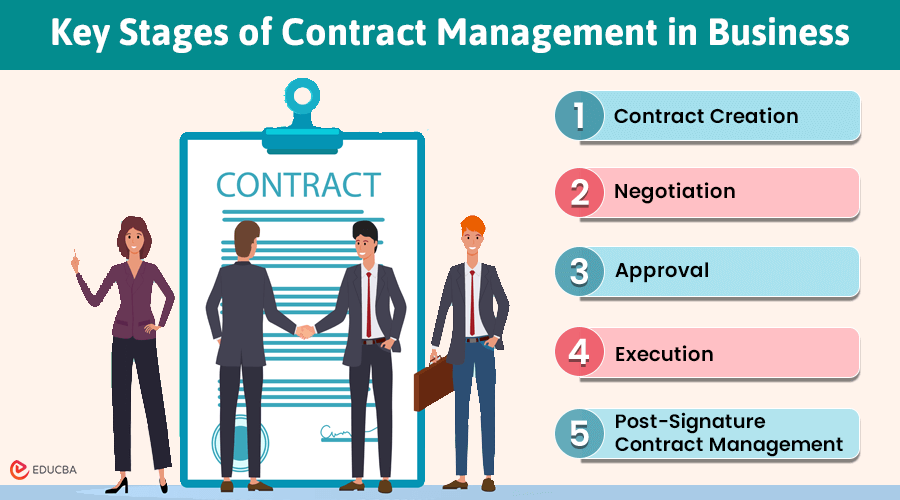
What is Contract Management in Business?
Contract management in business involves actively managing all aspects of contracts, including negotiating, drafting, and overseeing them after companies sign agreements with their partners, customers, or suppliers. Effective contract management ensures that agreements are clear, enforceable, and beneficial for all parties involved. It also includes monitoring compliance and performance throughout the contract’s duration.
Key Stages of Contract Management
The key stages of the contract management in business are as follows:
- Contract Creation: It involves drafting the initial terms and conditions of the contract and assuring that all parties meet the legal and business requirements.
- Negotiation: Parties discuss and revise the contract terms to reach a mutually beneficial agreement.
- Approval: The finalized contract is reviewed and approved by the relevant stakeholders within the organization.
- Execution: Both parties sign the contract, making it legally binding.
- Post-Signature Contract Management: This stage involves monitoring compliance, managing amendments, and ensuring all parties meet their contractual obligations.
Benefits of Contract Management
Effective contract management offers significant benefits through enhanced compliance and performance monitoring:
Benefits of Compliance in Contract Management
- Reduced Legal Risks: Proper contract management reduces the chances of not complying, which can result in legal disputes and financial penalties.
- Improved Vendor Relationships: Maintaining compliance builds trust and cooperation between parties, fostering stronger and more productive relationships.
- Operational Efficiency: Well-managed contracts streamline processes, reducing administrative burdens and improving overall efficiency.
Role of Performance Monitoring in Contract Management
Effective contract management also involves monitoring the performance of all parties involved. It includes:
- Tracking KPIs: Monitoring key performance indicators ensures all parties meet contractual obligations.
- Continuous Improvement: Regular performance reviews help identify areas for improvement, enabling businesses to take corrective actions promptly.
Risk Mitigation
Contracts inherently carry risks, and managing these risks is crucial. Spotting potential problems early and using strategies to reduce risks can help businesses avoid major financial and operational issues.
Common Contract Risks
- Non-Compliance: Failure to meet contractual obligations can result in penalties and damaged relationships.
- Financial Losses: Poorly drafted contracts or unfavorable terms can lead to financial losses.
- Reputation Damage: Disputes and legal issues arising from contract breaches can harm a company’s reputation.
Risk Mitigation Strategies
- Thorough Contract Review: Carefully review contracts before signing to identify and address potential risks.
- Clear Terms and Conditions: Ensure everyone involved clearly explains and understands all terms and conditions.
- Regular Audits: Conduct regular audits to monitor compliance and identify areas for improvement.
Benefits of Contract Management Software
- Automation: Automate routine tasks such as contract drafting, approval workflows, and reminders for key dates.
- Centralized Repository: Store all contracts in a centralized digital repository for easy access and management.
- Analytics and Reporting: Generate reports and analytics to gain insights into contract performance and compliance.
- Enhanced Collaboration: Facilitate collaboration with features like real-time editing and version control.
Post-Signature Contract Management in Business
Post-signature contract management refers to actively overseeing a contract after both parties have signed it. It includes:
- Monitoring Compliance: Regularly checking that all parties are fulfilling their contractual obligations.
- Managing Amendments: Handling any changes to the contract and ensuring they are documented and approved.
- Addressing Issues: Quickly resolve any disputes or problems that arise during the contract’s term.
- Performance Reviews: Regularly check whether the contract meets its goals and identify areas for improvement.
Training and Development for Contract Management Team
Training and development involve equipping your team with the skills and knowledge necessary for effective contract management. It includes:
- Legal Training: Providing education on relevant laws and regulations to ensure compliance.
- Negotiation Skills: Developing skills to secure favorable terms and build strong relationships with partners.
- Technology Training: Teaching staff how to use contract management software and other tools effectively.
Final Thoughts
Contract management is a critical function that impacts all aspects of business operations. Effective contract lifecycle management is essential for business success, from ensuring compliance and mitigating risks to leveraging technology and enhancing performance. By understanding its importance and implementing best practices, businesses can streamline processes, reduce risks, and build stronger relationships. Investing in training and technology further enhances contract management capabilities, equipping businesses to navigate modern contracts’ complexities and achieve strategic objectives.
Recommended Articles
We hope you found this “Contract Management in Business” article helpful. For more insights on contract management, check out the posts below.

